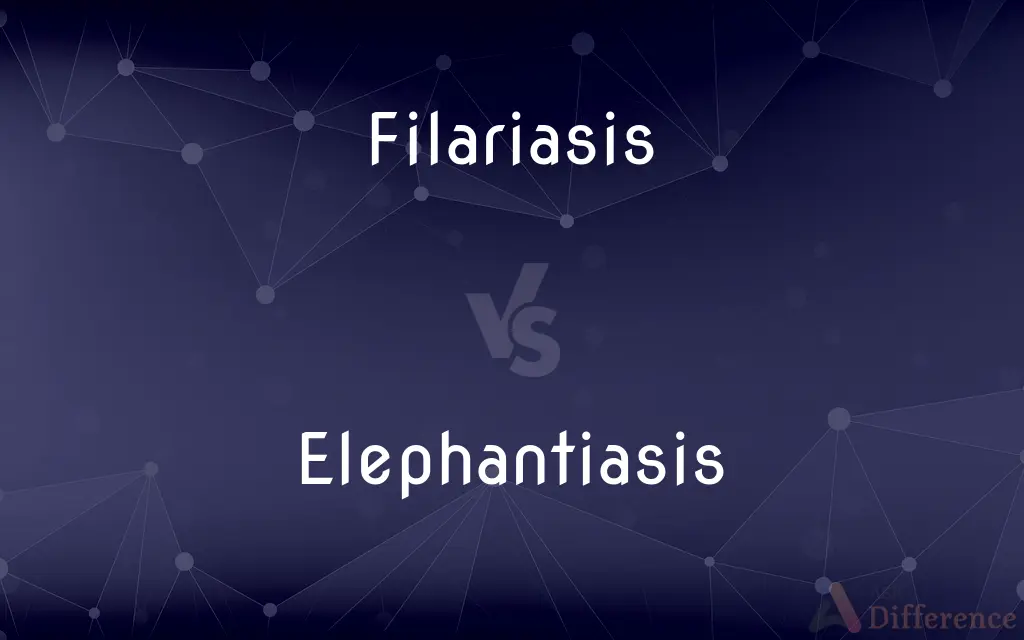Filariasis vs. Elephantiasis — What's the Difference?
By Fiza Rafique & Maham Liaqat — Updated on April 23, 2024
Filariasis is a parasitic disease caused by infection with roundworms, leading to chronic symptoms, whereas elephantiasis specifically refers to the severe swelling and thickening of the skin resulting from chronic filarial infection.

Difference Between Filariasis and Elephantiasis
Table of Contents
ADVERTISEMENT
Key Differences
Filariasis is a parasitic infection transmitted by insects, primarily mosquitoes, involving nematode worms like Wuchereria bancrofti. Whereas elephantiasis is the condition that can develop due to untreated filariasis, characterized by extreme swelling, especially in the limbs and genitals.
The infection of filariasis primarily affects the lymphatic system, leading to lymphedema and potential damage over time. On the other hand, elephantiasis represents an advanced stage of lymphatic damage causing severe, often disabling, swelling and skin thickening.
Prevention of filariasis focuses on controlling mosquito populations and administering preventive medication to at-risk populations. In contrast, managing elephantiasis involves intensive care to reduce swelling and manage pain, including hygiene measures, compression, and in some cases, surgery.
Filariasis can be asymptomatic or present mild symptoms for years before progressing to severe complications. Elephantiasis, however, is unmistakably severe and significantly impairs physical function and quality of life.
Comparison Chart
Definition
Parasitic infection by roundworms
Severe swelling and skin thickening from filariasis
ADVERTISEMENT
Cause
Roundworms like Wuchereria bancrofti
Chronic lymphatic system blockage
Primary Symptom
Lymphatic system damage, mild symptoms initially
Extreme swelling, skin thickening
Treatment Focus
Medication to kill parasites, mosquito control
Reducing swelling, improving mobility, and pain management
Compare with Definitions
Filariasis
Asymptomatic Initially.
Many people with filariasis do not show symptoms until the disease progresses.
Elephantiasis
Impairs Mobility.
The severe swelling from elephantiasis often makes walking difficult.
Filariasis
Parasitic Disease.
Filariasis is spread through mosquito bites in tropical regions.
Elephantiasis
Skin Thickening.
Over time, the skin affected by elephantiasis becomes thick and hard.
Filariasis
Affects Lymphatic System.
Chronic filariasis often leads to lymphedema.
Elephantiasis
Management is Challenging.
Managing elephantiasis requires consistent care and often physical therapy.
Filariasis
Involves Roundworms.
The roundworms causing filariasis can live in the human body for several years.
Elephantiasis
Severe Swelling.
Elephantiasis can cause a person's leg to swell enormously.
Filariasis
Preventable and Treatable.
Mass drug administration campaigns aim to eliminate filariasis in endemic areas.
Elephantiasis
Result of Chronic Filariasis.
Without treatment, filariasis can lead to elephantiasis.
Filariasis
Disease caused by infestation, especially of the lymphatic system, with filarial worms.
Elephantiasis
Elephantiasis is the enlargement and hardening of limbs or body parts due to tissue swelling. It is characterised by edema, hypertrophy, and fibrosis of skin and subcutaneous tissues, due to obstruction of lymphatic vessels.
Filariasis
Any disease common in tropical and subtropical countries resulting from infestation of the lymphatic system with nematode worms of the superfamily Filarioidea, transmitted by mosquitoes: characterised by inflammation.
Elephantiasis
Chronic, often extreme enlargement and hardening of cutaneous and subcutaneous tissue, especially of the legs and external genitals, resulting from lymphatic obstruction.
Filariasis
The presence of filariae within the body of an organism; infection with filariae. It is mostly found in tropical and subtropical regions.
Elephantiasis
A tropical filarial disease that often leads to this condition as a result of infestation of the lymph glands and vessels with filarial worms; lymphatic filariasis.
Elephantiasis
(pathology) A complication of chronic filariasis, in which nematode worms block the lymphatic vessels, usually in the legs or scrotum, causing extreme enlargement of the infected area.
Elephantiasis
Synonym of leprosy.
Elephantiasis
A disease of the skin, in which it become enormously thickened, and is rough, hard, and fissured, like an elephant's hide.
Elephantiasis
Hypertrophy of certain body parts (usually legs and scrotum); the end state of the disease filariasis
Common Curiosities
How does elephantiasis develop from filariasis?
Elephantiasis develops after years of chronic filarial infection that blocks the lymphatic system, causing severe swelling.
What are the symptoms of filariasis?
Early symptoms may be mild or absent, but chronic infection can lead to significant lymphatic damage and lymphedema.
What time of day is best for diagnosing filariasis?
Diagnosing filariasis is best done at night when the microfilariae are more active in the bloodstream.
Can filariasis be cured?
Yes, with appropriate antiparasitic medications, filariasis can be treated effectively.
What treatments are available for elephantiasis?
Treatments focus on managing symptoms and can include hygiene, compression garments, and in severe cases, surgery.
Is elephantiasis contagious?
No, elephantiasis itself is not contagious; it results from an individual’s prolonged internal infection.
What causes filariasis?
Filariasis is caused by infection with filarial worms, transmitted through mosquito bites.
Who is at risk for filariasis?
People living in tropical and subtropical areas where the mosquito carriers are prevalent are at risk for filariasis.
How can elephantiasis be prevented?
Preventing elephantiasis involves treating filariasis early and controlling mosquito populations.
How does filariasis affect daily life?
If it progresses to elephantiasis, it can severely impair physical mobility and quality of life due to extreme swelling.
Share Your Discovery

Previous Comparison
Impair vs. Impede
Next Comparison
Info vs. InformationAuthor Spotlight
Written by
Fiza RafiqueFiza Rafique is a skilled content writer at AskDifference.com, where she meticulously refines and enhances written pieces. Drawing from her vast editorial expertise, Fiza ensures clarity, accuracy, and precision in every article. Passionate about language, she continually seeks to elevate the quality of content for readers worldwide.
Co-written by
Maham Liaqat













































